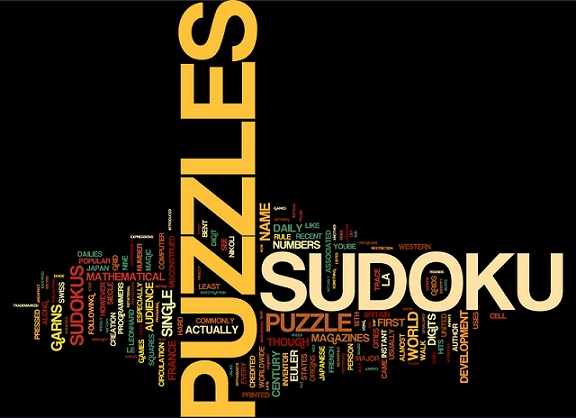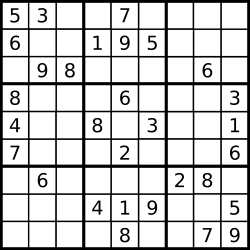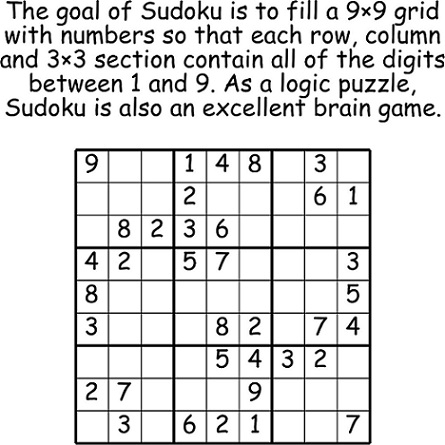Sudoku
An Introduction To Puzzles
Tips Strategies And Instructions
Sudoku is a number placement puzzle that requires logic, skills and patience. It is puzzle craze that is played around the world. Have you ever played with a Rubik's Cube? You may have mastered the Rubik's cube and are looking for a greater challenge. Try the puzzle game called Sudoku. Sudoku is a number placement puzzle that requires logic skills and patience. It is a fantastic puzzle game that can be found in newspapers, books and on puzzles and games websites.

How to play Sudoku? The Sudoku puzzle consists of a series of grids. The grids include one large 9 x 9 grid that houses, nine 3 x 3 smaller grids. The purpose of the game is to place a number from 1-9 in each of the grid cells. You don't have to worry about finding the sum of the numbers of the rows, columns, like in Magic Squares. No addition is involved; however there are three conditions that rely on each other and must be followed.

Typical Sudoku Puzzle
Each number 1-9 can appear only once in each column, once in each row, and once in each small 3 x 3 grid. Mathematically, Sudoku puzzles are a derivative of Latin Squares. The famous mathematician Leonard Euler created Latin Squares. They are a prevalent part of discrete math. Basically, a Latin Square consists of an n x n table filled with numbers, letters, or symbols.
Each symbol can only appear exactly once in each row and exactly once in each column. Sudoku puzzles take the Latin Square one step further with the 3 x 3 smaller grid constraints. The fact that you have to make sure that each small 3 x 3 grid contains each number 1-9 only once significantly increases the complexity of the puzzle. Sudoku puzzles come in varying levels of difficulty. The amount of numbers given initially in the 9 x 9 matrix varies. One would think that the more numbers you are given initially, the easier the puzzle would be to solve. This is not always the case because the "placement" of the numbers has a profound effect on the complexity of the puzzle.
Where did Sudoku puzzles originate? Sudoku is the Japanese word for "placement puzzle". Sudoku swept Japan in the mid-1980's. Before that, however, a puzzle constructor in the United States named Howard Garnes created the first puzzle of this type in 1979. It was called "Number Place" instead of Sudoku. It was published in the Dell Magazine Math Puzzles and Logic Problems.
We Are Helping 1000 Businesses Amplify Their Online Presence
How to solve Sudoku? Good question! The key is to have patience and use your logic skills. Don't just use a trial and error method. Many players construct their own puzzle solving techniques and methods, which they share in Sudoku player online forums. You can start anywhere in the puzzle, but as a beginner start by focusing on the top three smaller 3 x 3 grids. Look at the initial numbers and start with the number "1". Check to see if a "1" appears in the other two smaller 3 x 3 grids. Then find cells in these smaller grids where you can possibly place a "1" while still adhering to the rules.
You will also need to take into consideration 3 x 3 grids that are attached to the given grid. It is like dancing on eggshells, but the key is to look for patterns. Logically, you need to prove why a number should go in a particular cell. Sudoku is a clever puzzle game that will sometimes make you feel like you are going around in circles.
However, practicing on different puzzles will help you to understand certain techniques that work and those that lead you to a dead end. The beauty of the game is that there are a great number of Sudoku puzzles to solve. Time yourself. Many puzzle solvers can finish a puzzle in 10 to 30 minutes. Get out your stopwatch and see how fast you can solve a Sudoku puzzle.

What are the benefits of sudoku for the brain? It helps you practicing your logical thinking process when you are solving a puzzle, and eventually improve your number skills. It minimizes the chances of developing Alzheimers by keeping your brain active. Learns to do things quickly. Not only is playing Sudoku interesting, it also helps to increase your sense of time. Just like physical exercise, your mind need some exercise too. Playing sudoku actually exercises your brain extensively.
Here are some benefits of playing Sudoku: Improves your memory. Memory and logic work side-by-side when you are playing Sudoku. We use our memory to memorize the numbers, when we use our logic to figure out the next blank. Stimulates your mind. It keeps you practicing your logical thinking process when you are solving a puzzle, and eventually improve your number skills.

Reduces the chances of developing Alzheimers by keeping your brain active. Learns to do things quickly. Not only playing Sudoku is interesting but it helps to increase your sense of time. You will learn how to make a decision and take an action with less hesitation. Increases your concentration power. Sudoku requires players to think strategically and solve problems creatively. Once you stop playing in the middle of the game, you have to start the whole thinking process, which helps you to develop your concentration power and re-focus skills.
Feel Happy. Sudoku gives you a sense of accomplishment when you can solve a puzzle, especially the puzzle is a difficult one. By playing Sudoku more often, you can solve the puzzle faster and eventually advance to a harder level. Exercise your mind and you will become happier and smarter.From now on, spare a little time to play Sudoku everyday!
Are You Addicted To Your Hobby?
Tips And Information On Badge Lanyards
Browse All Our Informative Topics
InternetBusinessIdeas-Viralmarketing Home Page
Tweet
Follow @Charlesfrize













New! Comments
Have your say about what you just read! Leave a comment in the box below.